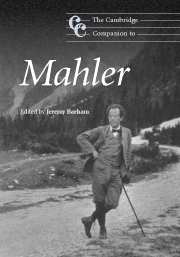Book contents
- Frontmatter
- Introduction: Marginalia on Mahler today
- PART ONE Cultural contexts
- PART TWO Mahler the creative musician
- PART THREE Mahler the re-creative musician
- 10 Mahler as conductor in the opera house and concert hall
- 11 Arrangements and Retuschen: Mahler and Werktreue
- PART FOUR Reception and performance
- Appendix: selected discography
- Notes
- Bibliography
- Index
11 - Arrangements and Retuschen: Mahler and Werktreue
from PART THREE - Mahler the re-creative musician
Published online by Cambridge University Press: 28 September 2011
- Frontmatter
- Introduction: Marginalia on Mahler today
- PART ONE Cultural contexts
- PART TWO Mahler the creative musician
- PART THREE Mahler the re-creative musician
- 10 Mahler as conductor in the opera house and concert hall
- 11 Arrangements and Retuschen: Mahler and Werktreue
- PART FOUR Reception and performance
- Appendix: selected discography
- Notes
- Bibliography
- Index
Summary
To most of his contemporaries Mahler was known first and foremost as an operatic conductor. He was active in this sphere from 1880 to 1910, reaching the heights of the profession. That he always wanted to be free of the routine of the theatre and to conduct concerts is perhaps not surprising, given that all his mature compositions involve concert orchestras; but, since there were few independent concert orchestras, like most conductors in Germany and Austria Mahler was obliged to earn his living mainly in the opera house.
Mahler's model for the concert conductor was exceptional in all senses: Hans von Bülow, who had not held a regular operatic appointment since he left Hannover in 1880. Bülow was a fine pianist who championed the late Beethoven sonatas and gave the first performance of Tchaikovsky's First Piano Concerto, was Wagner's chosen conductor for the premières of Tristan and Die Meistersinger, and later a friend of Brahms. Mahler wrote to Bülow after one of the latter's concerts with the Meiningen Orchestra when it visited Kassel in January 1884, asking to be taken on as an apprentice; but Bülow replied curtly and coldly and when choosing a replacement assistant in Meiningen in 1885 preferred to recommend his inexperienced protégé, Richard Strauss, over either Mahler or Felix von Weingartner. Later, in Hamburg, Bülow would recognize Mahler's gifts as a conductor, though not as a composer and, apart from the occasional performances he gave in Prague and Budapest, Mahler's first real opportunities as a conductor of the symphonic repertoire presented themselves in Hamburg when he deputized for Bülow in December 1892 and took over the ‘Bülow concerts’ with the Hamburg Philharmonic after his death in February 1894.
- Type
- Chapter
- Information
- The Cambridge Companion to Mahler , pp. 178 - 200Publisher: Cambridge University PressPrint publication year: 2007
- 3
- Cited by



